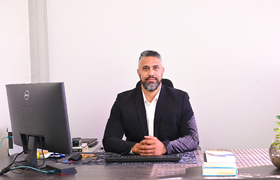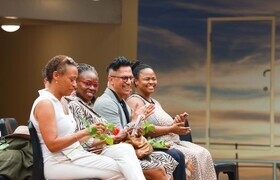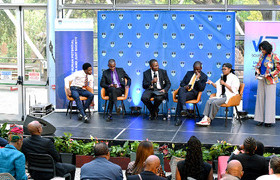Rest, Ami Faku and ‘painting my office red’
05 November 2025 | Story Kamva Somdyala. Photos Lerato Maduna. Read time 4 min.
What do “Jerusalema” by Master KG and “Don’t Fence Me In” by Roy Rogers have in common? These are songs senior lecturer in African Languages and Literatures Dr Tessa Dowling is dedicating to her retirement.
A 2019 Distinguished Teacher Award (DTA) recipient, Dr Dowling, who first started teaching at the University of Cape Town (UCT) in the late 1980s as a tutor, is looking forward to resting – at least for the first few months of retirement. “Complete rest, for starters! Then I will toddle out and potter in the garden, bake in a messy way, which includes much tasting, and do some private teaching with seriously hard-working, driven people who often feel dead tired and broken but hide it well. I must also finish my book on language change in isiXhosa. And wash my car.”
Kamva Somdyala (KS): Tell us a bit about yourself?
Tessa Dowling (TD): I listen to uMhlobo Wenene FM while exercising most mornings. It helps me keep fit, improve my isiXhosa and feel less crabby. I have six interesting siblings who, like me, all hate admin but do it anyway. All my nephews and nieces and my best buddy call me doll. My partner does so much better at the game Connections than I do but shakes my hand when I get Wordle out in three. I only have a few friends, because to get my friendship someone must make me laugh, source obscure classics for me to read, and admit they feel dead tired and broken.
KS: What are the things that have remained constant throughout your teaching career?
TD: Students asking me whether something I’m talking about will be in the exams (when I think what I’m saying is profound and inspiring); mistakes on an exam paper I have checked a thousand times; students who amaze with fabulous isiXhosa phrases picked up from friends, and requests for extensions (happily not of the hair variety).
KS: At what point did you decide that you wanted to teach isiXhosa?
TD: Hundreds of years ago, when I heard my clever colleagues Sydney Zotwana and Derek Gowlett chatting about isiXhosa grammar. It made me feel very happy, so I thought I had to spread the word.
KS: You once described your teaching style as “electric”. Have you felt, equally, that same enthusiasm from students over the years?
TD: Did I really say that? I do try to put energy into all my teachings – though there have been some periods of loadshedding. I have had some brilliant and talented students who light up and energise the places they work in.

KS: What perspectives have you gained from students over the years?
TD: Embrace sleep. It is a favourite answer they give to the question “uthanda ukwenza ntoni ngempelaveki?” (What do you like to do on the weekend?) “Ndithanda ukulala” (I like to sleep) is the answer given by 90% of well-rested, relaxed-looking students.
KS: If your teaching career were a chapter title in isiXhosa, what would it be?
TD: Uyazama, shem. (She tries, shame).
KS: Is there a song that can capture your teaching journey?
TD: Ami Faku’s “Inde Lendlela” (This road is long). Not mainly for the lyrics, but rather for that mournful way she starts the song.
“Thank you for letting me paint my office red.”
KS: On a personal note, how have you observed and measured the impact of your work, research and teaching?
TD: Postgraduate students say they enjoy reading my journal articles because they can understand them. Not sure if that counts as impact, but it shows how a down-to-earth writing style gets students reading academic literature. I like bumping into past students who tell me that they use the Xhosa they learnt at UCT with me and colleagues in the jobs they do, and I think that’s a way of empowering people.
KS: What is your parting message to UCT?
TD: Thank you for letting me paint my office red. (Or perhaps they didn’t know I was doing it).
 This work is licensed under a Creative Commons Attribution-NoDerivatives 4.0 International License.
This work is licensed under a Creative Commons Attribution-NoDerivatives 4.0 International License.
Please view the republishing articles page for more information.










